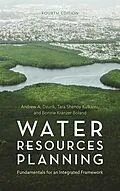Now in an extensively updated fourth edition, this essential text offers a comprehensive survey of all aspects of water resources planning and management. Utilizing an integrated water resources management (IWRM) framework, the authors show how this approach can clarify and help resolve resource management problems in ways that take into account complicated and interconnected social, economic, and environmental needs. Spanning the full planning process, the book considers legal and administrative issues; economic and forecasting factors; water quality, quantity, supply, use and demand; and model applications. The authors' goal throughout is to provide a practical foundation for improving ecological and human environmental systems for practitioners and students alike.
Autorentext
Andrew A. Dzurik is professor emeritus of environmental engineering at Florida State University. Tara Shenoy Kulkarni is associate professor in the Department of Civil and Environmental Engineering at Norwich University.
Bonnie Kranzer Boland is lecturer in the Whiting School's Engineering for Professionals program at Johns Hopkins University and a water resources consultant.
Inhalt
List of Figures and Tables
Preface
Acknowledgments
Abbreviations
1 Introduction: The Watery Planet
Troubled Waters
Calming Seas
Navigating the Path
Watermarks
Historical Perspectives on Water Resources Development
Evolution of Water Resources Planning
1800 to 1900: Emergence of Water Resources Planning
1901 to 1933: Multipurpose Projects
1934 to 1943: Economic Considerations
1944 to 1969: Multiobjective Focus
1970 to 1980: Environmental Era
1981 to 2018: Devolution and Environmental Protection
Diving In: Scope of the Book
Study Questions
2 The Planning Process
Introduction
Key Terms
Scope of Planning
Levels of Planning
The Water Resources Planning Process
Planning Steps
Problem Identification
Data Collection and Analysis
Goals and Objectives
Problem Diagnosis
Formulation of Alternatives
Analysis of Alternatives
Evaluation and Recommendations
Implementation
Surveillance and Monitoring
The Rational Planning Model
Incorporation of Planning in Federal Activity
The Benefit-Cost Approach
Problems with the Rational Planning Model
Technical Adjustments
Incrementalism
Optimization
Multiple-Objective Approach
Social and Political Adjustments
Advocacy Planning
Citizen Participation
Radical Planning
Trends in Planning
Risk Assessment
Alternative Dispute Resolution
Adaptive Management
Collaborative Governance
Integrated Water Resources Management
Savannah River Basin
McKenzie River Basin
Benefits of IWRM
Barriers to IWRM
Obstacles to Planning
Benefits of Planning
Study Questions
3 Hydrologic Fundamentals
Introduction
Key Terms
The Hydrologic Cycle and Water Budget
Hydrologic Cycle
Precipitation
Infiltration
Evaporation and Transpiration
Surface Runoff
Groundw...
